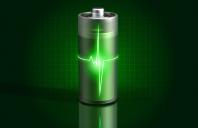New Battery Aims to Make Renewable Energy More Efficient
A new startup company, Aquion, has begun production of a low-cost sodium-ion battery intended to make the grid more efficient and allow consumers to use solar power around the clock, reported MIT Technology Review late last week.
The new battery lasts more than twice as long as lead-based batteries, which provides consumers with an affordable way to store solar power for use at night or during cloudy weather. The battery is charged by a renewable energy system, such as solar panels, and then stores the energy for later use. The batteries will allow the grid to accommodate greater amounts of intermittent electricity produced by renewable energy, which addresses recent concerns voiced by utility companies that the intermittent energy flow could damage the grid.
The battery was invented by Jay Whitacre, a Carnegie Mellon professor of materials science and engineering. The new battery will cost about twice as much as a lead-based battery but is made of much more environmentally friendly materials; Whitacre said the batteries, which consist of materials such as manganese oxide and water, are so safe that consumers could eat them. Lead has been recognized by the State of California as toxic and is known to cause cancer and birth defects.
Aquion recently finished installing its first commercial-scale production line at a factory near Pittsburgh. The startup has raised $55 million of venture capital funding from investors including Bill Gates, and expects to begin full-speed production by this spring.
The Chanler Group is actively engaged in the review and analysis of incentive-based renewable energy programs to determine potential benefits to our clients. Global energy consumption continues to increase each year and, with this increase, the demand for safe, clean, and unlimited energy is on the rise. The Federal and State governments promote this interest through a variety of financially-beneficial incentives. Our understanding of these laws allows us to guide homeowners, businesses, and/or developers through the various ways to take advantage of these incentive-based benefits. With the appreciation that renewable energy laws and regulations are constantly changing, The Chanler Group is committed to investing in its understanding and practice of this area of law.

